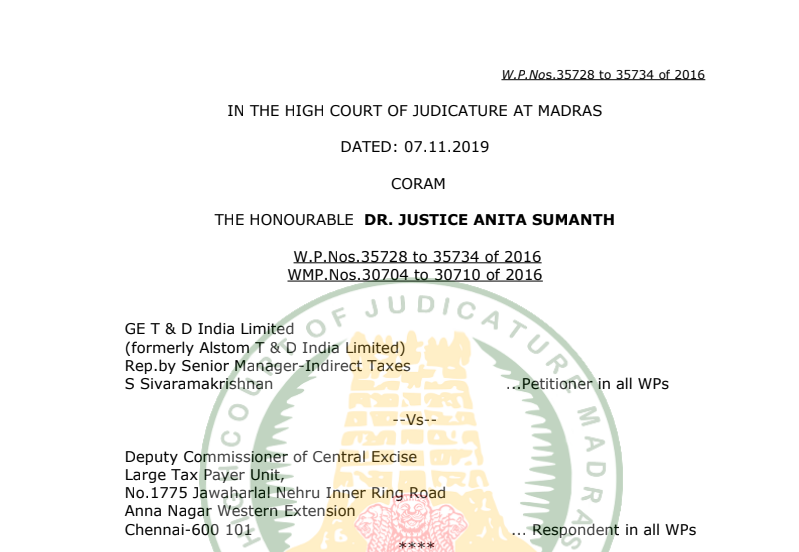No GST on Notice pay: Madras High Court
Table of Contents
Case covered:
GE T & D India Limited(formerly Alstom T & D India Limited)
The petitioner in all WPs
Versus
Deputy Commissioner of Central Excise
Respondent in all WPs
Facts of the case:
Writ Petitions filed under Article 226 of the Constitution of India, to issue a Writ or order of direction or any other Writ in the nature Writ of Certiorari, calling for the records on the file of the respondent in proceedings Order in Original Nos.LTUC/360 to 366/2016-DC dated 30.06.2016 and quash the same.
- The petitioner is a dealer assessed to service tax by the respondent. The terms of employment of the petitioner company include a stipulation for a notice period prior to quitting from employment, ranging from two to three months. An option is provided to the employees to the effect that if they are not in a position to stay and serve out the notice period, then in lieu of the same, the employee will be required to pay the equivalent pay of salary for the period for which notice was not served.
2. Thus, in a case where an employee wishes to quit, it is incumbent upon the employee to put the employer to notice in advance of a stipulated period to enable recruitment of a new employee and smooth transition of the work carried on by the employee, who proposes to quit. It also facilitates a situation where the employee may desire immediate quitting by enabling him to do so, however, also ensuring that some compensation is provided to the employer by virtue of the sudden and unexpected termination of duty.
3. The petitioner, in this case, had received certain amounts in lieu of notice period from outgoing employees. The Assessing Officer was of the view that this amount would attract service tax since the petitioner is deemed to have facilitated the termination of employment and thus a category of service entitled and described as ‘facilitation of termination of employment’ was carved out by the Assessing Officer.
4. Seven show-cause notices were issued relating to different units of the petitioner all over the country. Despite objections raised, the proposals for assessment were confirmed vide the impugned orders dated 30.06.2016, which are challenged by way of the present batch of writ petitions.
5. Service tax is levied upon the receipts from the rendition of services as defined in terms of Section 65(44) of Chapter V of Finance Act, 1994 (‘Act’) as follows:
(44) “service” means any activity carried out by a person for another for consideration, and includes a declared service, but shall not include-
(a) an activity which constitutes merely,-
(i) a transfer of title in goods or immovable property, by way of sale, gift or in any other manner; or
(ii) such transfer, delivery or supply of any goods which is deemed to be a sale within the meaning of clause (29A) of Article 366 of the Constitution; or
(iii) a transaction in money or actionable claim;
(b) a provision of service by an employee to the employer in the course of or in relation to his employment;
(c) fees are taken in any Court or tribunal established under any law for the time being in force.
6. This includes Declared Services defined in Section 66E of the Act reading thus:
66E.Declared services
The following shall constitute declared services, namely:-
(a) renting of immovable property;
(b) construction of a complex, building, civil structure or a part thereof, including a complex or building intended for sale to a buyer, wholly or partly, except where the entire consideration is received after issuance of completion certificate by the competent authority.
Explanation: For the purposes of this clause,-
(1) the expression “competent authority” means the Government or any authority authorized to issue completion certificate under any law for the time being in force and in case of non-requirement of such certificate from such authority, from any of the following, namely:-
(A) an architect registered with the Council of Architecture constituted under the Architects Act, 1972 (20 of 1972); or
(B) chartered engineer registered with the Institution of Engineers (India); or
(C) licensed surveyor of the respective local body of the city or town or village or development or planning authority;
(II) the expression “construction” includes additions, alterations, replacements or remodeling of any existing civil structure;
(c) temporary transfer or permitting the use or enjoyment of any intellectual property right;
(d) development, design, programming, customization, adaptation, up-gradation, enhancement, implementation of information technology software;
(e) agreeing to the obligation to refrain from an act, or to tolerate an act or a situation, or to do an act;
7. According to the Revenue, payment in lieu of notice constitutes payment to an employee by the employer for the notice period or vice versa where the employer/employee desires an immediate exit from the organization.
8. This arrangement, the Revenue argues, would attract the provisions of Section 66E(e), whereby agreement by an entity to the obligation to refrain from an Act or to tolerate an act or a situation, or to do not act, would constitute taxable service. According to the respondent, the petitioner has tolerated the act of immediate quitting from service, by the employees and such agreement/toleration results in the rendition of a taxable service.
9. Heard Mr.Joseph Prabakar, learned counsel for the petitioner and Mr.A.P.Srinivas, learned Senior Standing Counsel for the petitioner.
Observation of Honourable Madras High court:
10. The provisions of Section 66E(e) appear to have given rise to some ambiguity, on this very issue, clarified by the Central Board of Excise and Customs (CBEC) in CBECs’ Guidance Notes dated 20.06.2012. At para 2.9.3 the Board states as follows:
2.9 Provision of service by an employee to the employer is outside the ambit of service.
2.9.3. Would amounts received by an employee from the employer on premature termination of the contract of employment be chargeable to service tax?
No. such amounts paid by the employer to the employee for premature termination of a contract of employment are treatable as amounts paid in relation to services provided by the employee to the employer in the course of employment. Hence, amounts so paid would be chargeable to service tax. However, any amount paid for not joining a competing business would be liable to be taxed being paid for providing the service of forbearance to act.
11. The query raised relates to a contra situation, one, where amounts have been received by an employee from the employer by reason of premature termination of the contract of employment, and the taxability thereof. The Board has answered in the negative, pointing out that such amounts would not be related to the rendition of service. Equally, so in my view, the employer cannot be said to have rendered any service per se much less a taxable service and has merely facilitated the exit of the employee upon imposition of a cost upon him for the sudden exit. The definition in clause (e) of Section 66E as extracted above is not attracted to the scenario before me as, in my considered view, the employer has not ‘tolerated’ any act of the employee but has permitted a sudden exit upon being compensated by the employee in this regard.
Crux of the case: Termination of employment is not a service., No GST on Notice pay
12. Though normally, a contract of employment qua an employer and employee has to be read as a whole, there are situations within a contract that constitute rendition of service such as breach of a stipulation of the non-compete. Notice pay, in lieu of sudden termination, however, does not give rise to the rendition of service either by the employer or the employee.
13. Towards conclusion Mr.Srinivas, Counsel raises the plea of availability of alternative remedy. However, since the matter involves an interpretation of the statutory provision in the light of undisputed facts available on record, I see no need to relegate the petitioner to statutory appeal. This plea is also rejected.
14. In view of the above discussion, these writ petitions are allowed. Consequently, connected miscellaneous petitions are closed. No costs.
Download the judgment:
I hope it is useful for all corporates facing such issues. It is now decided that No GST on Notice pay. Termination of employment is not a service.
 CA Shafaly Girdharwal
CA Shafaly Girdharwal
CA
New Delhi, India
CA Shaifaly Girdharwal is a GST consultant, Author, Trainer and a famous You tuber. She has taken many seminars on various topics of GST. She is Partner at Ashu Dalmia & Associates and heading the Indirect Tax department. She has authored a book on GST published by Taxmann.









